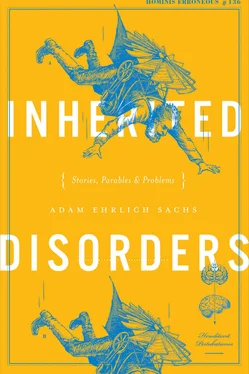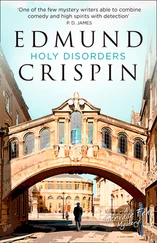Yes, he would get his art into his father’s head through the front of it rather than the two sides. Forget the sides, he thought, reinvigorated. The front! The front!
He returned to his Finnish hut in 1928, committed to inventing a visual idiom that would let him communicate to his father, in a painting, the essence of Piano Sonata No. 4. Not since grade school had he held a paintbrush. But after two years of arduous study he had mastered the basics, and after two more he had translated his musical idiom into a corresponding visual one. At this point he sent a letter to his mother asking simply, “How is Father’s vision?” She sent an effusive loving letter in return, filled with maternal irrelevancies, but noting at the end that Father’s vision was fine and he was excited to see the painting. In his fifth year in the hut the composer painted his colossal Composition IV , which expressed perfectly the essence of his fourth sonata. Carefully, very laboriously, he transported the canvas back to Leipzig, bent over beneath its weight for the final leg from the train station home. His mother opened the door grimly. Behind her his father hobbled toward them with a cane, one eye milky white, the other covered by an eyepatch.
“I’m so sorry,” she whispered.
“I understand you have made a very nice painting!” his father shouted. “And very important!”
Back at the Finnish hut the composer contrived a third way into his father’s head. The sides were blocked, as was the upper part of the front, but there was still, he realized, lower down on the same plane, his father’s nose, and tongue. He learned to cook, transposing the inner essence of his fourth sonata into a meal for his father to ingest, but returned to Leipzig to find that the old man — though filled with encouraging words for his son’s cookery — was fed now a prescribed paste by tube to the stomach and could not himself taste it.
His father’s head was wholly closed off to him. Every ingress was occluded, ears to nostrils. His final stay in the Finnish hut was spent ruminating darkly on his father’s impermeability to his art. One morning he filled his pockets with heavy stones and strode into the lake. But at the moment the water reached his neck, he suddenly stopped. Perhaps, he thought, the endless, fruitless attempt to transmit to his father the essence of his art was the essence of his art.
He emptied his pockets and hurried down to Leipzig, where with a fingertip he pressed, letter by letter, this epiphany into his father’s palm. His father, robbed of almost every sense and recently of speech, responded by grabbing his hand and squeezing it tightly and rapidly, again and again, like the contractions of the heart, for minutes on end. The composer couldn’t tell, of course (and this was now a part of his art), whether he had understood completely or completely lost his mind.
…………………….
The son of a certain king in the Davidic line was astonished and a little irritated when his father — already in his seventh decade — announced plans to build an immense temple out of white marble in the center of the city.
“You watch,” the son told his attendant. “ I will have to finish building that huge marble temple.”
It was true. After only a quarter of the immense marble temple had been built, the king keeled over, dead. His son became the new king. But instead of completing the vast marble temple his father had begun, he decided to abandon it and begin building his own immense marble temple right beside it.
Construction went on smoothly for thirty years. Then, one day, with the immense marble temple about halfway done, the king dropped dead. The new king, his son, halted construction on the old temple and announced plans to erect a new temple — also of white marble, also immense, also in the city center — right beside his grandfather’s abandoned quarter-temple and his father’s abandoned half-temple. He oversaw the construction of two-fifths of a temple before he was poisoned by his son, now known, aside from regicide, for building a third of an immense marble temple in the center of the city. This son’s son, in turn, declared himself “The Temple Builder.” He built two-ninths of a new marble temple — very vast and very central — before he died. After his death, there was a struggle for power. Each of the king’s three sons anointed himself his father’s successor, and each built a fraction of an immense white marble temple (a sixth of a temple, a half a temple, and three-sevenths of a temple, respectively) before they slaughtered one another.
Now a very powerful king arose, the eldest son of the second son. “I shall build a temple,” he told his people. “Not like those of my father and forefathers, responsible for these ruins that lie before you. No, my temple shall be immense . It shall be located in the center of the city . And it shall be made entirely of white marble .” He built three-eighths of a temple.
His son abandoned his father’s temple and built a fifth of his own marble temple. His son built four-ninths of his own immense white marble temple. His son abandoned the temple his father had begun and — importing white marble from the finest quarries in the known world — commenced construction of his own, right beside the others.
This king’s son was a student of history. It is said that he sat for nineteen years in the Library of Alexandria, refusing to leave until he had read every book there. When he finally came home, he stood on the balcony of his father’s palace and looked out over all these partial temples that littered his city. According to some texts, he wept. “When I am king,” he told his attendant, “I will finish building my father’s temple.”
But, for reasons that were not recorded, when his father died, leaving five-sixths of a temple and instructions for how it ought to be completed, the son abandoned it and started building his own vast marble temple. He built two-sevenths of it and died young, mere weeks after the birth of his son (a quarter of a temple).
…………………….
In 1936, Walter Rosenthal of the eponymous banking empire began searching urgently for a way to smuggle his family’s fortune out of Vienna. To carry it out as cash or gold, stocks or bonds, was impossible. At last, according to a family chronicle written by Rosenthal’s great-grandson, he hit upon the notion of smuggling it out as human capital. Rosenthal liquidated his banks and purchased humanistic educations for his four sons at the Sorbonne. One son studied Spinoza, another Romanticism, another Romanesque architecture, and the last Greek tragedy. Within a few years, all of his economic capital had been converted into wisdom, subtlety, irony, and prestige, which were then stashed (in the form of humanities professors) at four different American college campuses. According to the family chronicle, Rosenthal prudently stored half his capital (converted to humanists) on the West Coast, and the other half (also as humanists) on the East Coast. By the time Hitler’s tanks rolled into Paris, Rosenthal’s fortune was securely distributed across the United States, teaching art history survey courses and serving on departmental committees.
Naturally these humanities professors birthed other humanities professors, who in turn birthed humanities professors of their own, all of whom wrote books and essays and attended interesting events and formulated clever cultural critiques, thereby growing Rosenthal’s wisdom, subtlety, irony, and prestige empire at approximately the same rate it would have grown over the same period had it remained a financial empire. According to the family chronicle, the latest generation of Rosenthal humanists, writing in the wake of the 2008 recession, has been severely critical of capitalism, not realizing that they themselves, while ostensibly Jewish studies professors, comparative literature professors, sociologists of the workplace, and historians of capitalism, constitute in reality the capital stock of the Rosenthal dynasty. The chronicler himself, of course, as he notes, is in a particular bind: he would like to be critical of his family, but his every thought, no matter how critical, only contributes to the Rosenthal hoard of wisdom, subtlety, irony, and prestige, which could — in the course of just one generation — be converted back into cash.
Читать дальше












